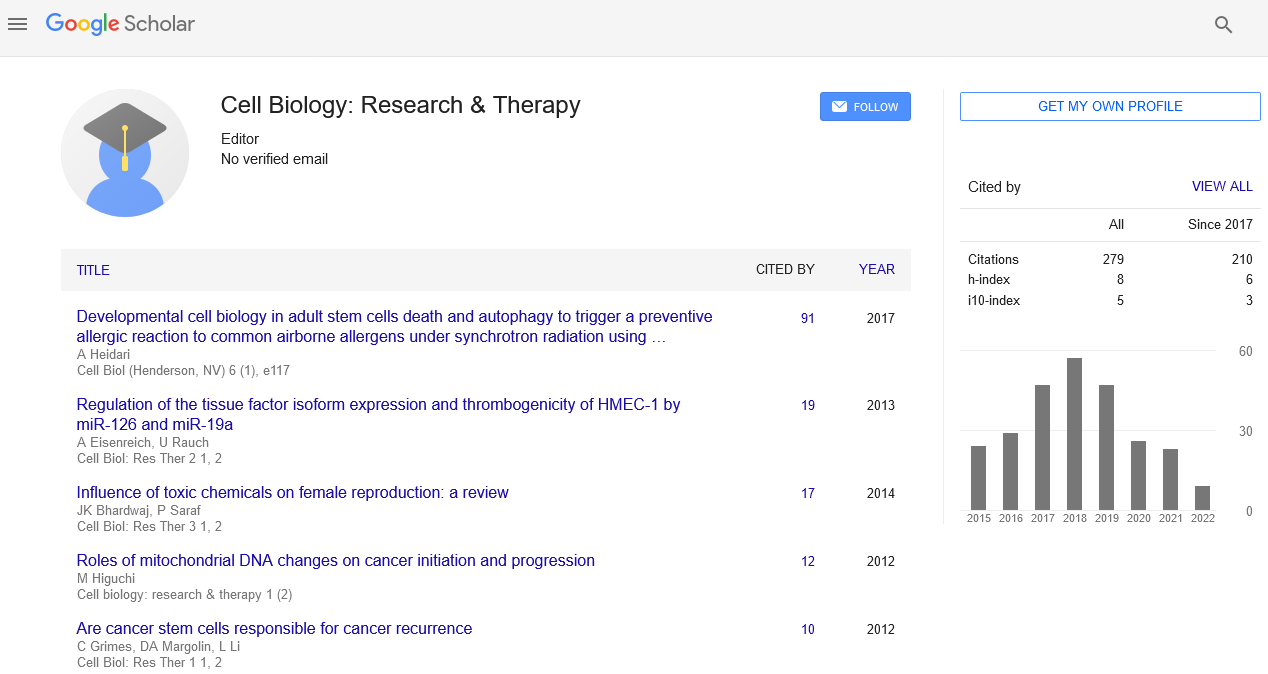Short Communication, Cell Biol Vol: 12 Issue: 3
Current Trends and Future Prospects in Stem Cell-Based Neurodegenerative Disease Therapies
Michelle Tanz*
1Department of Cell Biology, Harvard Medical School, Boston, USA
*Corresponding Author: Michelle Tanz,
Department of Cell Biology, Harvard
Medical School, Boston, USA
E-mail: tmichellea06@gmail.com
Received date: 02 September, 2023, Manuscript No. CBRT-23-116140;
Editor assigned date: 04 September, 2023, PreQC No CBRT-23-116140 (PQ);
Reviewed date: 18 September, 2023, QC No CBRT-23-116140;
Revised date: 25 September, 2023, Manuscript No CBRT-23-116140 (R);
Published date: 05 October, 2023, DOI: 10.4172/2324-9293.1000187.
Citation: Tanz M (2023) Current Trends and Future Prospects in Stem Cell-Based Neurodegenerative Disease Therapies. Cell Biol 12:3.
Description
Neurodegenerative diseases represent a significant burden on global healthcare systems, with limited treatment options available to halt or reverse their progression. Stem cell-based therapies have emerged as promising approaches for addressing these devastating conditions [1]. The current trends in stem cell-based therapies for neurodegenerative diseases, highlighting the various stem cell sources, mechanisms of action, and clinical trials. Neurodegenerative diseases, such as Alzheimer's disease, Parkinson's disease, and amyotrophic lateral sclerosis, are characterized by the progressive degeneration of neurons, leading to cognitive and motor impairments [2]. Despite extensive research, there are no curative treatments available for these devastating conditions. Stem cell-based therapies have emerged as a promising avenue for developing novel treatments, as they offer the potential to replace damaged or lost neurons and provide neuroprotective effects [3].
Stem cell sources
Embryonic Stem Cells (ESCs): ESCs are pluripotent stem cells derived from the inner cell mass of early-stage embryos. They can differentiate into various cell types, including neurons. ESC-based therapies have shown results in preclinical studies, but ethical concerns and immune rejection issues limit their clinical applications [4].
Induced Pluripotent Stem Cells (iPSCs): iPSCs are reprogrammed from somatic cells, offering a patient-specific and ethical alternative to ESCs. Researchers can differentiate iPSCs into neurons that closely resemble the patient's own cells, reducing the risk of immune rejection [5]. However, challenges related to the efficiency of differentiation and potential tumorigenicity must be addressed.
Adult stem cells: Adult stem cells, such as Mesenchymal Stem Cells (MSCs) and Neural Stem Cells (NSCs), can be isolated from various tissues, including bone marrow, adipose tissue, and the central nervous system [6]. MSCs have demonstrated neuroprotective and anti-inflammatory effects, making them attractive candidates for neurodegenerative disease therapies.
Mechanisms of action
Stem cell-based therapies for neurodegenerative diseases operate through multiple mechanisms:
Cell replacement: Stem cells can differentiate into mature neurons, replacing damaged or lost cells. This approach has been successful in animal models, with transplanted cells integrating into existing neural networks [7].
Paracrine signaling: Stem cells secrete various neurotropic factors and cytokines that support neuronal survival, promote neurogenesis, and modulate inflammation. These paracrine effects contribute to the therapeutic potential of stem cell-based treatments.
Clinical trials: Several clinical trials have assessed the safety and efficacy of stem cell-based therapies for neurodegenerative diseases [8].
Parkinson's disease: Clinical trials involving dopaminergic neuron transplantation from various stem cell sources have shown promising results in alleviating motor symptoms.
Alzheimer's disease: Trials using neural stem cells and mesenchymal stem cells to promote neuroprotection and repair are ongoing, with initial results suggesting potential cognitive improvements [9].
Amyotrophic Lateral Sclerosis (ALS): Stem cell-based approaches, including NSCs and iPSC-derived motor neurons, are being explored for ALS treatment, aiming to slow disease progression.
Safety concerns: Ensuring the safety of stem cell-based therapies remains a significant challenge, particularly regarding tumorigenicity, immunogenicity, and long-term effects.
Optimizing differentiation: Improving the efficiency and consistency of stem cell differentiation into functional neurons is crucial for treatment success [10].
Personalized medicine: Tailoring stem cell therapies to individual patients based on their genetic and cellular profiles holds immense results for maximizing treatment efficacy.
Emerging technologies: Advancements in gene editing, biomaterials, and 3D printing are likely to enhance the delivery and integration of stem cell-based therapies.
Conclusion
Stem cell-based therapies offer new hope for treating neurodegenerative diseases by providing cell replacement and neuroprotective effects. Ongoing clinical trials are providing valuable insights into their safety and efficacy. Despite challenges, including safety concerns and optimization of differentiation protocols, the field holds tremendous results. The future of stem cell-based treatments for neurodegenerative diseases may be characterized by personalized medicine and the integration of cutting-edge technologies, ultimately improving the quality of life for millions of affected individuals.
References
- Volarevic V, Ljujic B, Stojkovic, Aleksandra L, Nebojsa A, et al. (2011) Human stem cell research and regenerative medicine: present and future. Br Med Bull (99) :155–168.
[Google scholar] [Pubmed]
- Volarevic V, Erceg S, Bhattacharya SS, Petra S, Philip H, et al. (2013) Stem cell-based therapy for spinal cord injury. Cell Transplant 22:1309–1323.
[Google scholar] [Pubmed]
- Turner L, Knoepfler P. (2016) Selling Stem Cells in the USA: Assessing the Direct-to-Consumer Industry. Cell Stem 19:154–157.
[Crossref] [Google scholar] [Pubmed]
- Smith AG (2001) Embryo-derived stem cells: of mice and men. Annu Rev Cell Dev Biol 17:435–462.
[Crossref] [Google scholar] [Pubmed]
- Zhang X, Stojkovic P, Przyborski S, Michael C, Lyle A et al. (2006) Derivation of human embryonic stem cells from developing and arrested embryos. Stem Cells 24:2669–2676.
[Crossref] [Google scholar] [Pubmed]
- Thomson JA, Itskovitz EJ, Shapiro SS, Waknitz MA, Swiergiel J J, et al. (1998) Embryonic stem cell lines derived from human blastocysts. Science 8:1145114–1145117.
- Reubinoff BE, Pera MF, Fong CY, Alan T ,Ariff B, et al. Embryonic stem cell lines from human blastocysts: somatic differentiation in vitro. Nat Biotechnol. 2000;18:399–404 .
- De Trizio E, Brennan CS (2004). The business of human embryonic stem cell research and an international analysis of relevant laws. J Biolaw Bus 7:14–22.
[Google scholar] [Pubmed]
- Mayor S (2015). The shifting geography and language of cell biology. J Cell Bio 209(3):323-325.
[Crossref] [Google scholar] [Pubmed]
- Stojkovic M, Stojkovic P, Leary C, Vanessa JH, Lyle A, et al. (2005) Derivation of a human blastocyst after heterologous nuclear transfer to donated oocytes. Reprod Biomed Online.;11:226–231.
[Crossref] [Google scholar] [Pubmed]
 Spanish
Spanish  Chinese
Chinese  Russian
Russian  German
German  French
French  Japanese
Japanese  Portuguese
Portuguese  Hindi
Hindi 